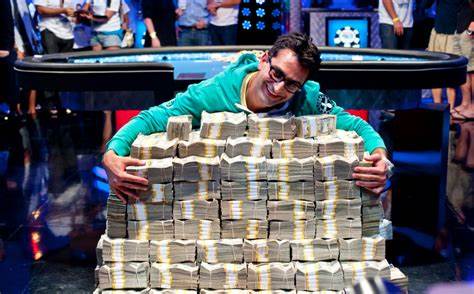10 Gambling Myths Debunked: Don't Believe Everything You Hear
Time to read: 30 min


- Introduction
- Myth 1: Casinos Rig the Games
- Myth 2: Card Counting is Illegal
- Myth 3: Slot Machines Are Due to Hit
- Myth 4: Online Casinos are Not Safe
- Myth 5: Winning Streaks Always End
- Myth 6: You Can't Win Big Without Betting Big
- Myth 7: Skill-Based Games Always Favor Skilled Players
- Myth 8: Online Casinos Control the Outcome of Games
- Myth 9: Betting Systems Can Beat the House
- Myth 10: Gambling Addiction Only Affects a Small Percentage of Players
- Conclusion
When it comes to gambling, there are many myths and misconceptions that people believe. These beliefs can be harmful, as they can lead individuals to make poor decisions when gambling. It's essential to debunk these myths and understand the truth about gambling. In this article, we'll explore 10 common gambling myths and why they're false.
Why Do Gambling Myths Exist?
Gambling myths exist for several reasons. One of the main reasons is that people often base their beliefs on anecdotal evidence rather than facts. For example, if someone hears a story about a person who won big by using a specific betting strategy, they may assume that the strategy is foolproof. However, this is not necessarily true, as gambling outcomes are based on chance and luck.
Another reason why gambling myths exist is that they can be perpetuated by the gambling industry itself. For instance, some casinos may promote the idea that their slot machines are "hot" or "due" for a payout, even though this is not based on any factual evidence. This can lead people to continue playing, thinking that they're more likely to win.
The Importance of Debunking Gambling Myths
Debunking gambling myths is crucial for several reasons. Firstly, believing in gambling myths can lead individuals to make poor decisions when gambling, which can result in significant financial losses. Secondly, it can perpetuate harmful stereotypes about gambling, which can be damaging to society as a whole.
Moreover, by debunking gambling myths, individuals can gain a better understanding of the reality of gambling. This can help to reduce the stigma surrounding gambling and promote responsible gambling practices. By understanding that gambling outcomes are based on chance and luck, individuals can make more informed decisions and gamble responsibly.
In the following sections, we'll explore ten common gambling myths and explain why they're false. By the end of this article, you'll have a better understanding of the truth behind these myths and be better equipped to make informed decisions when gambling.
Myth 1: Casinos Rig the Games

One of the most common gambling myths is that casinos rig their games to ensure that players lose. This myth has been perpetuated by movies and popular culture, where casinos are often portrayed as shady operations with rigged games. However, this couldn't be further from the truth.
How Casinos Make Money
Firstly, it's important to understand that casinos are businesses, and like any other business, they exist to make a profit. Casinos make money by offering games that have a built-in house edge. This means that, on average, the casino will win more money from players than it pays out in winnings. However, this is not because the games are rigged.
How Games Are Designed
Casino games are designed using sophisticated algorithms and software that ensure that the outcome of each game is entirely random. The software is regularly audited by third-party testing agencies to ensure that it's fair and unbiased. This means that every time a player spins a slot machine or plays a hand of blackjack, the outcome is entirely random and not rigged.
Refuting the Idea that Casinos Rig Games
The idea that casinos rig their games is entirely false. Rigging games would be illegal and would result in the casino losing its license to operate. Additionally, casinos have no reason to rig their games, as the built-in house edge ensures that they will make a profit over the long term.
Lastly, the idea that casinos rig their games is a common gambling myth that couldn't be further from the truth. Casinos make money by offering games with a built-in house edge, and the games are designed to be entirely random and fair. By understanding the truth behind this myth, players can gamble responsibly and enjoy their gaming experience without worrying about being cheated.
Myth 2: Card Counting is Illegal
Another common gambling myth is that card counting is illegal. This myth has been perpetuated by movies and popular culture, where card counters are often portrayed as criminals. However, the reality is quite different.
What Card Counting Is
Card counting is a strategy used by skilled blackjack players to determine the likelihood of specific cards being dealt. By keeping track of the cards that have been played, a skilled card counter can determine when the deck is favorable to the player and increase their bets accordingly. It's important to note that card counting is not cheating, as it doesn't involve any manipulation of the game.
Legal Issues Surrounding Card Counting
While card counting itself is not illegal, casinos do have the right to ban players who they suspect of using the strategy. This is because casinos are private establishments, and they have the right to refuse service to anyone. In addition, some casinos have implemented measures to make card counting more difficult, such as using multiple decks of cards or shuffling the deck more frequently.
Refuting the Idea that Card Counting is Illegal
The idea that card counting is illegal is entirely false. While casinos may ban players who use the strategy, there are no legal repercussions for card counting. In fact, the legality of card counting has been upheld in several court cases, including a landmark case in New Jersey in the 1980s.
To sum up, the myth that card counting is illegal is simply not true. While casinos may not appreciate the strategy and may ban players who use it, there are no legal issues surrounding card counting. Skilled players who employ the strategy can do so legally and ethically, as long as they are aware of the potential consequences of being banned from specific casinos.
Myth 3: Slot Machines Are Due to Hit
One of the most common gambling myths is that slot machines are due to hit. This myth suggests that if a slot machine hasn't paid out in a while, it is more likely to hit a big jackpot soon. However, this is simply not how slot machines work.
How Slot Machines Work
Slot machines are electronic devices that use a Random Number Generator (RNG) to determine the outcome of each spin. The RNG is a complex algorithm that generates random numbers at a rate of thousands per second. These numbers correspond to the symbols on the slot machine's reels, and the combination of symbols that appear on the reels determines the outcome of each spin.
Random Number Generator (RNG)
The RNG is a crucial component of modern slot machines, as it ensures that each spin is completely random and independent of the previous spins. This means that each spin has the same chance of hitting a winning combination, regardless of how many spins have come before it. The RNG is also regularly audited by independent third-party organizations to ensure that it is working as it should be.
Refuting the Idea that Slot Machines Are "Due" to Hit
The idea that slot machines are due to hit after a certain number of spins is entirely false. Each spin is completely independent of the previous spins, and the outcome is determined by the RNG, which generates random numbers at a rate of thousands per second. This means that the chances of hitting a jackpot are the same on every spin, regardless of how many spins have come before it.
To conclude, the idea that slot machines are due to hit is simply a myth. Slot machines operate on the basis of random number generation, which means that each spin has an equal chance of hitting a jackpot, regardless of how many spins have come before it. As with all gambling games, it's important to remember that there is always an element of chance involved, and no strategy or system can guarantee a win.
Myth 4: Online Casinos are Not Safe

Another common gambling myth is that online casinos are not safe, and players risk having their personal information stolen or their accounts hacked. However, this is not the case, as online casinos take a range of security measures to protect their players' information and ensure that their games are fair and secure.
How Online Casinos Operate
Online casinos operate in much the same way as traditional brick-and-mortar casinos, except that they are accessible through a website or mobile app. Players can create an account, deposit funds, and play a wide range of casino games, including slots, table games, and live dealer games.
Security Measures Online Casinos Take
To ensure the safety of their players, online casinos use a range of security measures, including SSL encryption technology to protect players' personal and financial information. They also require players to verify their identity before they can withdraw funds, which helps to prevent fraud and ensure that players are who they say they are. Additionally, online casinos are regulated by government authorities and must adhere to strict licensing requirements to ensure that their games are fair and their operations are transparent.
Refuting the Idea that Online Casinos are Not Safe
Contrary to popular belief, online casinos are actually very safe and secure. They use the latest encryption technology to protect players' information and ensure that their games are fair and transparent. Online casinos are also subject to regular audits by independent third-party organizations, which ensures that their games are truly random and that their operations are above board.
Of course, as with any online activity, there is always a risk of cybercrime or fraud. However, reputable online casinos take every precaution to prevent this from happening, and players can take steps to protect themselves by choosing a reputable casino with a good track record, using strong passwords, and avoiding sharing personal information with anyone they don't trust.
The idea that online casinos are not safe is simply a myth. Online casinos are subject to rigorous security and regulatory requirements, and use the latest encryption technology to protect players' information and ensure that their games are fair and secure. While there is always a risk of cybercrime or fraud, players can take steps to protect themselves and enjoy a safe and enjoyable online casino experience.
Myth 5: Winning Streaks Always End
Many gamblers believe that when they're on a winning streak, they should stop playing before it ends. This is based on the idea that winning streaks always come to an end. However, this is just another myth in gambling that is not necessarily true.
How randomness works in gambling
In gambling, the outcome of each game is determined by chance or luck, which is often referred to as "randomness." Randomness means that each event is independent of the others, and the probability of a particular outcome occurring remains the same.
For example, if you flip a coin and it lands on heads ten times in a row, the probability of it landing on heads on the eleventh flip is still 50/50. The previous outcomes do not affect the current outcome.
The Gambler's Fallacy
The Gambler's Fallacy is the belief that if a particular event has not happened for a while, it becomes "due" or more likely to happen. For instance, if a player has won several games in a row, the Gambler's Fallacy might lead them to believe that they are due to lose the next game.
However, this idea is flawed. Each game has its own independent probability, and past events do not affect future outcomes. Just because a player has won several games in a row does not mean that they are due to lose the next one. Each game has the same probability of winning or losing as the previous ones.
Refuting the idea that winning streaks always end
Although it is true that most winning streaks eventually come to an end, it is not a guarantee. As we have explained, each event in gambling is independent, meaning that the outcome of the next event is not influenced by the previous one. Therefore, it is possible to continue winning for an extended period, and it is equally possible to lose for a long time.
In conclusion, winning streaks do not always come to an end, and gambling outcomes are determined by chance. It is essential to understand the basics of gambling and avoid falling into the trap of believing in myths. It is also important to gamble responsibly and within one's financial limits.
Myth 6: You Can't Win Big Without Betting Big

Have you ever heard someone say, "You have to bet big to win big"? While there is some truth to this statement, it's not entirely accurate. Let's take a closer look at how odds and payouts work, as well as how progressive jackpots work.
How odds and payouts work
Every casino game has odds, which refer to the probability of winning. The odds of winning are different for every game, and they also vary depending on the type of bet you place. For example, in roulette, betting on a single number has lower odds of winning but a higher payout, while betting on a color has higher odds of winning but a lower payout. The higher the odds of winning, the lower the payout will be.
How progressive jackpots work
A progressive jackpot is a type of jackpot that increases every time a player places a bet. A small percentage of each bet is added to the jackpot, which can reach millions of dollars. Progressive jackpots are often found in slot machines, but they can also be found in other casino games like poker or blackjack. Winning a progressive jackpot is a matter of luck, but it's not necessary to bet big to have a chance at winning one.
Refuting the idea that you can't win big without betting big
While it's true that the higher the bet, the higher the potential payout, it's not necessary to bet big to win big. In fact, many people have won huge jackpots with small bets. For example, in 2003, a man named Chris Moneymaker won the World Series of Poker Main Event with a $39 buy-in. He ended up winning over $2.5 million. Similarly, there have been many instances where players have won progressive jackpots with small bets.
It's not necessary to bet big to win big. While the potential payout may be higher with bigger bets, there are plenty of examples of people winning large sums of money with small bets. It's important to remember that gambling should always be done responsibly, and you should never bet more than you can afford to lose.
Myth 7: Skill-Based Games Always Favor Skilled Players
Hskill-based games work
Skill-based games are those that involve a degree of skill or strategy rather than relying solely on chance. Examples of skill-based games include poker, blackjack, and sports betting. In these games, players can use their knowledge and strategy to improve their odds of winning.
In poker, for example, players must make strategic decisions based on the cards they are dealt and the actions of their opponents. They must also use their knowledge of the game and their opponents to bluff and outwit their opponents. Similarly, in sports betting, players must analyze statistics, injury reports, and other factors to make informed bets.
The role of luck in skill-based games
Although skill is an important factor in skill-based games, luck also plays a significant role. In poker, for example, a skilled player may still lose to a less skilled player who happens to get lucky and hit a lucky card. In sports betting, unexpected events such as injuries or weather conditions can also impact the outcome of a game, regardless of how much skill was involved in making the bet.
Refuting the idea that skill-based games always favor skilled players
Despite the role of skill in skill-based games, it is not always the case that skilled players will win. As mentioned, luck can play a significant role, even in games that involve a high degree of skill. In addition, other factors such as fatigue, distraction, or emotions can also impact a player's performance.
Furthermore, skill-based games are not always played in a fair environment. In poker, for example, some players may collude or cheat to gain an unfair advantage. In sports betting, some bookmakers may offer unfair odds or manipulate the outcome of games.
In conclusion, while skill-based games do require a degree of skill or strategy, they are not always fair and do not always favor skilled players. Luck and other factors can play a significant role, and players must be aware of the potential for cheating or unfair play.
Myth 8: Online Casinos Control the Outcome of Games

One of the biggest misconceptions about online casinos is that they control the outcome of the games to ensure that the players lose. This is simply not true. Just like with land-based casinos, online casinos use a Random Number Generator (RNG) to determine the outcome of the games.
How online casino games work
Online casino games are designed to mimic the experience of playing in a physical casino. The difference is that the games are played online using a computer or mobile device. The games are programmed with specific rules and algorithms that determine the outcome of each round of play.
The role of RNG
The RNG is the heart of the online casino games. It is a computer program that generates a random sequence of numbers that determine the outcome of each game. The numbers are generated at random, so there is no way for the casino to predict the outcome of any particular game. The RNG is constantly running, even when no one is playing, to ensure that the outcomes are completely random.
Refuting the idea that online casinos control the outcome of games
It is simply not in the best interest of online casinos to control the outcome of games. Online casinos make their money by taking a small percentage of each bet placed by players. This is known as the house edge. Online casinos have no reason to cheat their players because if they did, they would lose the trust of their customers and ultimately go out of business.
In addition, online casinos are subject to strict regulations and testing by independent auditors to ensure that their games are fair and random. These audits are carried out regularly and the results are published for all to see. If an online casino is found to be cheating, they would face severe consequences, including losing their license to operate.
The idea that online casinos control the outcome of games is simply not true. Online casinos use the same RNG technology as land-based casinos to ensure that the games are completely random and fair. While luck does play a role in the outcome of the games, players can be assured that online casinos have no control over the results.
Myth 9: Betting Systems Can Beat the House
Many gamblers believe that they can beat the house by using betting systems. A betting system is a strategy that a player uses to determine the amount of their bet based on previous outcomes. The most common betting systems include the Martingale, Paroli, Fibonacci, and Labouchere systems. These systems are often advertised as being able to help players win consistently, but in reality, they are flawed.
The idea behind betting systems is that by adjusting your bet size based on the outcomes of previous bets, you can increase your chances of winning. However, this assumption is based on the false belief that previous outcomes have an impact on future outcomes. In reality, the outcome of each bet is independent of the outcome of previous bets. This is known as the Gambler's Fallacy, which is the belief that previous outcomes affect future outcomes in a game of chance.
The truth is that betting systems don't work because they can't change the odds of a game. Betting systems don't alter the house edge, which is the advantage that the casino has over the player. The house edge is built into the game's rules and is determined by the odds of the game. No matter what betting system a player uses, the odds of the game remain the same. Betting systems may help players manage their bankroll or reduce their losses, but they cannot change the odds of a game or give players an advantage over the house.
Betting systems are based on the flawed assumption that previous outcomes can affect future outcomes. However, each outcome of a game is independent of the outcome of previous games, and betting systems cannot change the odds of a game. Betting systems may help players manage their bankroll or reduce their losses, but they cannot give players an advantage over the house. The only way to beat the house is by getting lucky or by using strategies in skill-based games that have a lower house edge.
Myth 10: Gambling Addiction Only Affects a Small Percentage of Players

Gambling addiction, also known as pathological gambling, is a serious mental health disorder that can have devastating consequences for individuals and their families. It is characterized by a compulsion to gamble despite negative consequences and can lead to financial ruin, relationship problems, and even suicide. Contrary to popular belief, gambling addiction is not a rare occurrence and can affect a significant number of players.
Studies have shown that the prevalence of gambling addiction varies widely depending on the population studied and the criteria used to define it. However, research indicates that gambling addiction affects approximately 1-2% of the general population, which is not a small number. Moreover, the number of people at risk for developing gambling addiction is much higher.
One reason why gambling addiction is often underestimated is that it is not always easy to identify. Unlike substance addiction, which can result in physical symptoms, gambling addiction is often hidden and can go undetected for a long time. In addition, many people with gambling addiction are ashamed or embarrassed to seek help, which further contributes to the underreporting of the problem.
It is important to recognize that gambling addiction is a serious issue that can have significant negative consequences for individuals and their loved ones. If you or someone you know is struggling with gambling addiction, seek help from a qualified professional who can provide support and resources to help manage the addiction.
Conclusion: Myths Debunked
Throughout this article, we have explored 10 common myths that surround gambling. We have seen how these myths are not only false but also harmful in perpetuating inaccurate beliefs about gambling.
We have debunked the myth that casinos control the outcome of games and that online casinos are rigged. We have also challenged the idea that betting systems can beat the house and that winning streaks always come to an end. We have explained how skill-based games involve luck and how progressive jackpots work. Additionally, we have examined the prevalence of gambling addiction and challenged the myth that it only affects a small percentage of players.
It is crucial to understand that gambling is a game of chance and that the odds are always against the player. While it is possible to win, it is important to approach gambling with accurate information and responsible practices.
Responsible Gambling
It is essential to approach gambling with a healthy mindset and to only gamble what you can afford to lose. Setting a budget for gambling and sticking to it can help prevent excessive spending. It is also important to take breaks from gambling and to seek support if you feel that you may be developing a gambling problem.
We hope that this article has provided you with valuable information and helped debunk some of the common myths surrounding gambling. Remember to gamble responsibly and have fun!